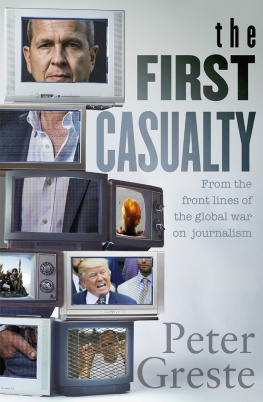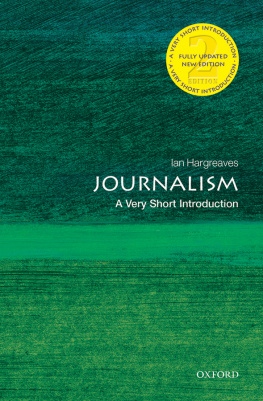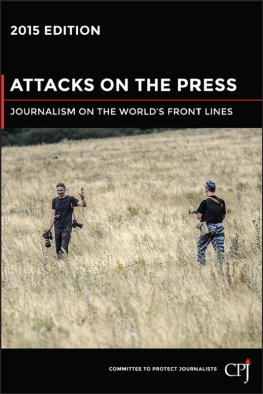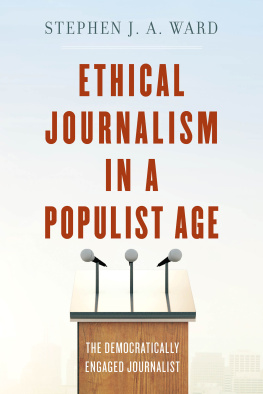It starts with a knock at the door.
The pounding is heavy, urgent, with a force that I am getting ready to go for a swim in the Marriott Hotels expansive heated pool. My computer is streaming Triple J a favourite Australian alternative-rock radio station and I am running out of time to get into the water before dinner. Im due to meet an old colleague from the BBC who I havent seen for years, and Im looking forward to swapping gossip.
Im half-dressed, wearing only my jeans, when the hammering begins again. I throw on a shirt and stride to the door just as a third round of knocking starts up.
I dont bother to look through the peephole. Its either someone from the hotel, probably with a message of some sort, or one of the Al Jazeera team keeping watch over the unfolding political crisis that I am here to report on. Id have thought they would call, though.
As soon as I lever the handle down, the door flies open as if pushed by a spring. Im shoved backwards as the room fills with heavy-set men. Five, six, seven, eight of them too many to count. I have no choice but to back up the entrance hall to the window overlooking the hotels leafy courtyard.
The men rifle through my bags, opening cupboards, searching corners, with Triple J providing the soundtrack.
Mr Peter? demands the one who appears to be the leader. He is clean-shaven unusually for Egypt, where thick moustaches are the fashion. He also has no chin, and a small pot belly pushing its way through a leather jacket, and is wearing a checked shirt and jeans standard anonymous street code for any middle-class, middle-aged Egyptian man. But there is an authority in his voice that demands it be heard.
Yes, I reply. And who are you?
He nods, but says nothing. I am standing with my back to the window, feeling bewildered and confused, and powerless to stop the raid.
The men keep searching. One unzips my grimy field bag and up-ends the contents onto the bed. There is a camera, my notebook, my passport, an iPod, a half-empty bottle of water, a tangle of headphones, a half-eaten packet of chocolate, and a Leatherman pocketknife all the standard bits of kit for either a tourist or a foreign correspondent. Among the group of men moving around the room, I notice one with a small hand-held video recorder. He hoses it across the equipment, pointing it at the computer, my notebook, my business cards, the mess covering the bed, and me whenever I open my mouth.
Who are you? I demand again, this time my voice tightening with tension as the search continues. Are you the police? Are you hotel security? What the hell is going on? The questions spill out of me like the jumble of things from the bag.
Still nothing.
Even though Ive been through this kind of thing before, these men show alarming seriousness and professionalism. I take my mobile phone from my hip pocket, but before I can look at the screen to dial, its snatched from my hands. The men start sweeping up the rest of my equipment. One slams the lid of the laptop shut and the music stops. There is silence as he shovels the computer into the bag along with the rest of the kit.
You will come with us, says Leather Jacket.
Not until you tell me who you are, I reply. What are you doing? Why are you here? Where is your ID?
We are from the Ministry of the Interior.
So where is your ID? How do I know? Do you have a warrant? Where are you taking me? The cameraman now has the lens pointed at my face, pushing in to within a few inches of my cheek. I can feel my face flush as I struggle to hold my composure.
Must. Not. Get. Angry.
We are from the Ministry of the Interior, he repeats. That is enough. What is in the safe? Open it.
The safe is full of cash about US$9000. Thats not unusual: in countries with unreliable credit-card systems, cash is still the norm, and I have brought enough to pay the hotel bill and any other expenses. Im worried that the moment I open it, they will take it. The thought of a bribe crosses my mind, but for all their shabby attire, these men move with the decisiveness of disciplined professionals. There has been no hint that this is about money, either none of the knowing nods and winks that usually suggest a discreet few hundred dollars might solve the problem. I refuse to open the safe.
Leather Jacket turns to a man in a black suit and tie, who is wearing a name tag that labels him as hotel security. I havent noticed him before in the melee, and after a brief conversation, he disappears out the door.
He is getting the master key. Or you can open it now. Its your choice.
Im not sure if Leather Jacket is bluffing, so I cross my arms and stare at the men as they continue to search and clear the room.
The hotel security guy returns with a master key, and I realise I have no option. I open the safe and show them the block of cash, expecting Leather Jacket to make it vanish inside the coat lining. Instead, he gestures for me to put it into my own pocket and orders everyone out of the room. It is time to go.
With my heart pounding, I grab a black fleece jacket and my Akubra hat. Its midwinter and the Cairo night is surprisingly cold. Im worried, but not panicking just yet. Ive been looking for telltale bulges beneath their jackets and I cant see any concealed weapons. And I know I have done nothing wrong. Im certain that this will get all sorted out in an hour or so, as soon as they realise theyve made a mistake.
Ive been in this situation before, with officious security officers from a nervous government. There is usually a lot of bluster and swagger designed to intimidate, to show who is in control, but unless youve genuinely done something wrong, it almost always ends with a couple of hours in a smoky room, some angry gestures and a few phone calls.
Almost always.
Im escorted down the hall to the lift. We exit on the ground floor and march purposefully across the courtyard, where glamorous Egyptian couples huddle in their coats smoking shisha pipes. They chatter and giggle as we pass, happily oblivious to anything beyond their own intimate bubble and the fragrant apple-scented smoke hanging in the chilled evening air, and I resist the urge to call for help, to run for it, to dash through the tables and dive through a side door to freedom. I flirt with the idea of elbowing the man on my right in the groin and swinging a right hook at the guy on my left, until I look again and realise that they are both about 15 centimetres taller than me, and twice as heavy.
And anyway, I have done nothing wrong, so there is nothing to worry about.
I am shepherded into a small ground-floor room with a desk, an armchair and a hotel couch. The air is thick with stale cigarette smoke and the table has on it nothing but an ashtray overflowing with butts and old grey powder. Behind it is a police officer with rolls of fat bulging under his chin and spilling over his belt, and I am relieved and worried at the same time. It is good news because it is immediately rumbled by a gang of thugs with an audacious plan. But it is also obvious that this is going to take a while.
Why am I here? I demand, figuring that as long as I am asking the questions, I have a degree of control, however tiny. Who sent these men? Do you have a warrant?
Of course we do, says the policeman. But can you read Arabic?
I cant read Arabic, and nor can I speak it. I have been in Egypt only two weeks, filling in while others are away over the Christmas New Year period. I have worked across the Middle East over the years, but never for long enough to make learning the language a priority. I am feeling it now.






